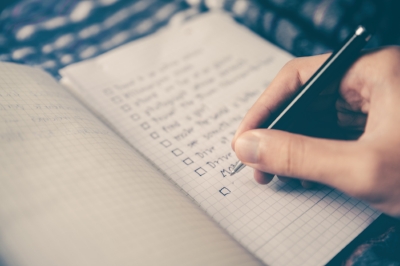
Q: I am feeling overwhelmed with everything on my plate. How do I even know where to start?
A: This morning, I started unloading the dishwasher, ran out to refill an empty box of cereal, got out vitamins, put away some Shabbos dishes, continued unloading the dishwasher, heard the ding and ran down to switch out the laundry, brought up the girls’ Shabbos dresses to their room, remembered the dishwasher…
Have you ever had a morning like this? Or whole days, or even weeks? Especially now, with the summer ending, school beginning, and the Tishrei holidays edging ever nearer, it can be a lot to handle. When all the tasks that are yelling for my attention crowd each other out, and I feel overwhelmed, it’s time for a brain dump.
The idea behind a brain dump is simple but powerful: get everything out of your head so you can organize and handle it.
Our brains can only hold so much before things get lost and our attention gets scattered. And humans are really not as good at multi-tasking as we think. What we call multi-tasking is really switch-tasking, where we waste precious time and brain power repeatedly adjusting to the new task, as we disengage from the previous task, and then jump back again.
One way to help calm the storm is to do a brain dump. You can do it electronically on a computer, phone, or tablet. I’m more comfortable with low-tech paper, so I carry around a pretty notebook and make lists of everything that I can think of. It’s not in any particular order at this point; it’s more like an idea purge. Everything in my head—no matter what order—gets written down. Each page might contain things about new clothes for growing kids, registering for a shul event, making pediatrician appointments, project plans, errands, etc. Anything that is nagging at my mind, I write down. There’s no rhyme or reason.
It is a mess in this stage, but now isn’t the time to try and tame it. I just keep writing down everything I can think of. I usually fill several pages this way.
When your spontaneous ideas start to run out, find a brain dump list and use it to jog your memory on other things, and then keep writing. My list goes like this:
-
Errands (Dry cleaner, Judaica, specialty shops, library, etc.)
-
Phone calls to make (appointments?)
-
To-buy list
-
Clothing and shoes
-
House hot spots (where things gather)
-
Routines and charts
-
Habits to develop
-
Upcoming holiday planning
-
Menu planning
-
Calendar items
-
Kids’ school
-
Sports and afterschool activities
-
Birthdays and parties
-
Bills
-
Paperwork
-
Budgeting
-
Work
-
Repairs to house/apartment/car
-
Maintenance for house/apartment/car
-
Gardening/outdoor work
-
Shabbos
-
Appointments
-
Guests
-
System revision
-
Self-care
-
Goals
Once you have the majority of the things formerly swirling around your head captured on paper (or in electronic form), you can get to work in a more focused way. You should also gather the papers you have to deal with, and organize them onto your lists. Look through the list for items that need immediate attention, and write a to-do list—or several—from there. You can divide other items up into projects, make lists, figure out what you can delegate, etc. You can update your calendars and schedule in time for projects. As you transfer something to a list or just do it, you can cross off the item on your brain dump sheet.
I keep the notebook handy for a few more days because I always find other things to add. But at the end, your mind should be clearer and calmer. You can prioritize what needs to get done, and make lists to manage the rest.
Cross items off your brain dump list when they are done. Sigh in relief.
There is always a lot to do, and it can be overwhelming, even with good systems in place. Life throws a lot at us, but with a brain dump, it’s not all churning around in your head, trying to get your attention, so you can focus on what you choose.